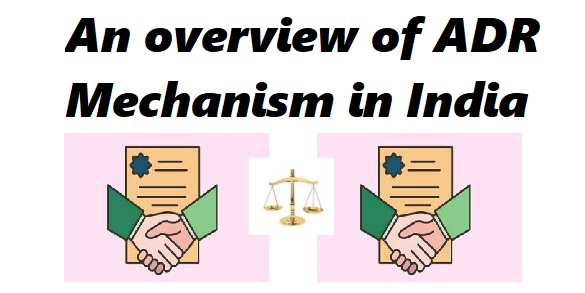
Home » An overview of ADR mechanism in India

Alternative Dispute Resolution (ADR), which is often thought of as a faster way to get justice, is one of the main options to the old court system. Despite the fact that society has long used a system like to ADR. Such a technique for resolving disputes existed in practically all ancient communities. Numerous mythical tales provide examples. The Panchayat system, which is currently being reconstructed into Lok Adalat, is one such pervasive example in contemporary Indian culture.
The main reason the Arbitration and Conciliation Act of 1996 was made was to help the Indian courts handle less work. This introduction gave arbitration and conciliation a chance to be seen as the best ways to settle a disagreement. Along with these two, negotiation and mediation are also considered forms of ADR, even though they are not ruled by laws. The ADR mechanism can be seen as a result of the desire to settle disputes peacefully, quickly, and effectively. The Directive Principles of State Policy in the Indian Constitution make it clear that India, as a welfare state, wants to give all of its citizens quick and fair justice. One thing to keep in mind about this option to the court system that works well is the problems that come with it.
The need for better conflict resolution methods is urgent in today’s world of globalisation and technology. Despite being relatively new, the ADR system will have a significant impact on the development of the legal system. Due to the urgency of today’s world, developed nations already favour these approaches for resolving disputes. Our society and government must see this need as well and address the drawbacks and difficulties of ADR as soon as possible in a constructive and more efficient manner.
From
Dr.Rahul,
Assistant Professor,
Lingaya’s Vidyapeeth
June 21, 2023RECENT POSTS
CATEGORIES
TAGS
Agriculture Agriculture future AI Architecture artificial intelligence Bachelor of Commerce BA English BA Psychology BTech AIML BTech CSE BTech cybersecurity BTech Engineering Business management career Career-Specific Education career guide career option career scope Civil engineering commerce and management Computer Science Computer science engineering Data science degree education Engineering Engineering students English Literature english program Fashion Design Fashion design course Higher Education Journalism journalism and mass communication law Law career Machine Learning mathematics MBA MBA specialization Mechanical Engineering Pharmacy Psychology Research and Development students
University Address: Nachauli, Jasana Road, Faridabad, Haryana
For Admissions :
Toll Free: 1800-120-4613
Mobile : 8447744303 | 8447744304 | 8447744306 | 8447744309
8700003974 | 8700003411 | 8700003749
Address: C-72, Second Floor, Shivalik, Near Malviya Nagar,
Above HDFC Bank, New Delhi 110017
Landline No. - 011-46570515 / 45138169 / 41755703
Mobile No. - +91-7303152412 / +91-7303152420 / +91-9311321952
Jagmani Kutir, Ground Floor, Road No-1, Rajeev Nagar,
Near Darbar Marriage Hall, Patna-800024, Bihar
Contact No: 9818352069/ 8130120095
Mail: kanhaiya@lingayasvidyapeeth.edu.in
Copyrights © 1998 - 2025 Lingaya's Vidyapeeth (Deemed To Be University). All rights reserved.
It is important to note that the following email IDs and domains are fraudulent and do not belong to our university.
LV only conducts physical/online verification of any document related to examination on the following email id: